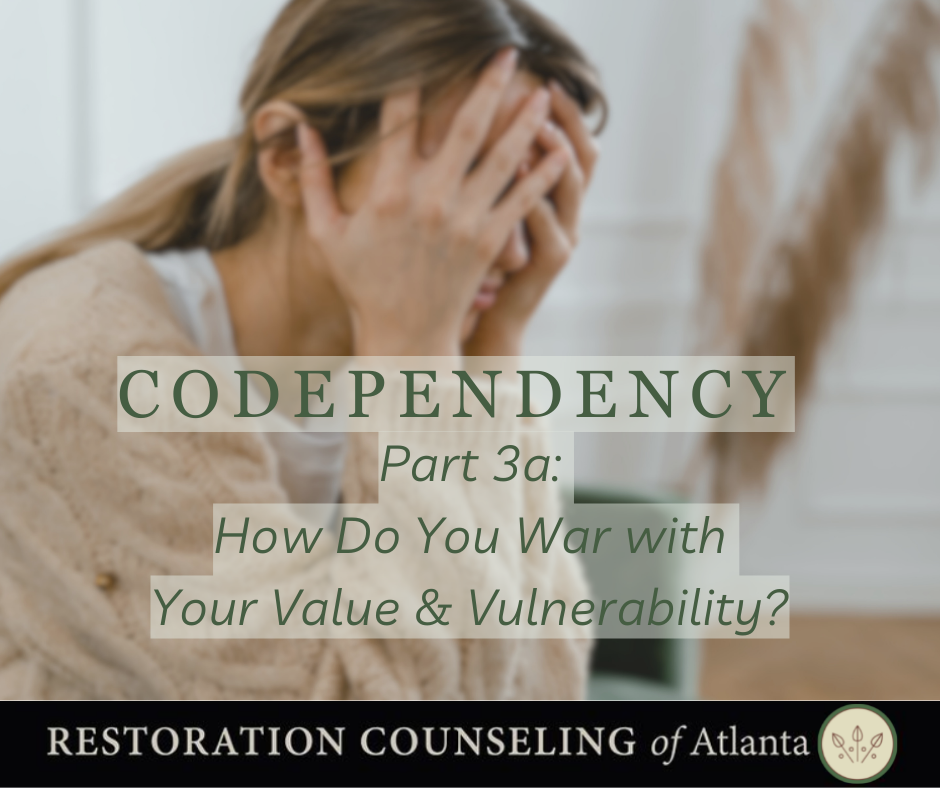Part 3a: How Do You War With Your Value & Vulnerability?
In previous articles, we covered why it is important to notice the presence of codependency in our lives. In part 1 and part 2, we explored our inherent qualities as finite persons made in God’s image. Next, we will revisit the second section in our adapted chart to see the deviations on each side from the leading-to-life narrow path God’s design invites us toward (Matthew 7:13-14).
To refresh our memories, we are born valuable, vulnerable, imperfect, dependent (needing/wanting), and immature. We need to go through the developmental process of being formed from one degree of glory to the next (2 Corinthians 3:18). Each quality of our humanity provides an avenue to develop the character of Christ so that we can be complete (mature) and lacking nothing (James 1:4).
The shifts away from reality may help us survive initially. However, it halts the maturation process and disrupts our relationship with God, others, and ourselves. These interferences lead to the difficulties presented in the third section of our chart: challenges experiencing self-esteem, setting boundaries, owning our internal world and negative realities, taking care of our needs and wants, and the ability to express our reality appropriately. Despite being derailed in this initial endeavor, the good news is that God constantly invites us to reengage with the developmental process and expand our ability to be people of faith, hope, and love.
Use this information purely as feedback to take stock of current capacity, rather than an indictment. Where we are in any area will make sense based on the unique story God has given us to walk out.
Warring with Our Value
If we have learned to war with our inherent values, it will be difficult for us to have appropriate levels of self-esteem. Esteem means to hold respect, admiration, high regard, or honor for the person God has intentionally knit together (Psalm 139:13). It aligns with the Creator’s heart when we delight in and are awestruck by the beautiful image-bearer art that He has made. He looked at his creation and declared it very good (Psalm 139:14; Genesis 1:26-30). When this has gone awry, we can struggle with a sense of inferiority that places us beneath other image-bearers. Or, we can struggle with a sense of superiority that inappropriately props us above others.
The less-than stance is the result of having the normal qualities of being human met with subtle to explicit messages of shame, ridicule, critique, and contempt. This instills a deep sense of inadequacy and defectiveness. It also teaches us to look for our value in external means such as accolades, performance, approval, and acceptance. This pursuit disempowers us and fosters anxiety when we find our value in external factors.
The better-than stance is the result of denying or minimizing the normal qualities of being human, such as our imperfections, which are meant to invite us toward humility. It can also result from idolizing the qualities meant to invite us toward gratitude, such as our gifts. Often, we compare our qualities to others in order to feel superior, either “better than” or “not as bad as.” Either of these result in an aura of pride and arrogance.
Areas to Contemplate
- Take stock of your tendency to slide towards inferiority or superiority.
- Notice the thoughts around this drift in one direction or another.
- Notice if your feelings of value vacillate based on external factors.
- Notice resistance in honoring yourself or hesitation to be on equal footing with others.
Warring with Our Vulnerability
The next pattern to consider is the war surrounding our vulnerability and the way it disrupts our ability to execute functional boundaries. We are born into this world without any boundary system. It must be taught and experientially learned through the modeling of those around us. Boundaries consist of five areas (physical, emotional, intellectual, spiritual, and sexual). They are meant to define who we are, protect us from harm, and prevent us from inflicting harm. When this system is faulty, we can err on a spectrum of functioning as a completely open system without protection, or as a completely closed system without intimacy.
On the too-vulnerable side of the spectrum, we can function without any protection or with inconsistent protection, which leaves gaps in our defense system. This failure in teaching leaves us vulnerable to abuse and abusing. We cannot learn to admit to mistakes or reconcile relationships unless we have received consistent, kind, and reasonable confrontation regarding the impact of crossing boundaries. Additionally, if we have not been protected from violation, intrusion, or control in the five areas mentioned above, we learn to be permissive around abuse and boundary-crossing from others.
In contrast, we become invulnerable when we mimic the walls displayed by our caregivers. Boundaries are meant to be strong yet flexible, allowing for safety and intimacy. This creates relationships capable of meeting the primary human needs for authenticity and connection. Walls, on the other hand, are impenetrable. They provide solid protection against negative impact. However, they also prevent goodness from entering, leaving us incapable of receiving nourishment. We can hide behind walls of anger, fear, withdrawal, or words. As with many of our survival strategies, we can shift back and forth across the spectrum. This leads to significant confusion within relationships.
Exploring Survival Tendencies
- Notice your relationship with mistreatment. Have you been prone to allow it? How comfortable are you confronting it?
- Notice your relationship with mistreating others. When and why does it occur? How comfortable are you repairing or reconciling after your mistakes?
- Notice if you hide behind walls in your relationships or if you are comfortable allowing yourself to be known deeply.
Pursue slight shifts over time in these areas and continue to decrease the costly symptoms wreaking havoc on our relationships with God, others, and ourselves.
Keep an eye out for the next article! We have three additional survival strategy categories to explore. In the meantime, remember to interact with your in-process places with curiosity and compassion.

Written by: Becca Cline, LPC
Online Counseling Team
becca@restorationcounselingatl.com, ext. 156
Becca works with male and female clients who are 13 years or older. She sees couples, families, and individuals. She has worked with clients dealing with various issues, including depression, anxiety, addiction, grief/loss, trauma, abuse, spiritual issues, sexuality, family-of-origin issues, codependency, anger, and interpersonal and relationship issues.

